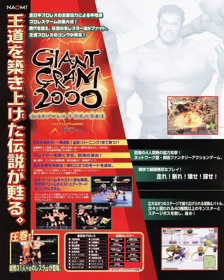Overview
Slashout is the third installment to the Spikeout series, released for Sega NAOMI hardware in 2000. Unlike other games in the series, Slashout has a completely different setting, based in a medieval fantasy world with different characters - gameplay remains similar, however.
It’s fairly standard fare for the genre, having the player pick from four archetypal fantasy heroes (Slash the fighter, Luna the dancer, Axel the warrior, and Kamui the ninja), and fight gangs of monsters in standard (though very nicely rendered) fantasy locations. There’s a little bit of RPG flavour, too, as collecting gems gives experience points with which you use to level up, though levelling only seems to refill and slightly extend your life bar, so it’s really just a different way of providing the extra lives at certain score intervals which traditional beat-’em-ups often have.
Slashout isn’t just a new lick of paint on an old genre, though, as it adds a fair bit of complexity. Not only are there two attack buttons with which to build combos, there’s also the addition of a strafe button, which does exactly what it sounds like it does, and is essential for dodging boss attacks. There’s magic, too, though it’s more of a powerful special move, than the screen-clearing bomb attack to which players who remember the Golden Axe games might be more accustomed to – though the limited ‘super magic attacks’ do offer the choice between something similar, or a temporary ‘berserk mode’, which allows players to take the risk of lowering their defence to increase their attack.
The only real problem Slashout has is the difficulty curve, which is more like a sheer vertical cliff. As soon as the game begins, you’re bombarded with crowds of enemies to fight off, and the game wastes no time in introducing foes with high-damage, hardto-avoid attacks, either. The aforementioned magic offers little solace, as it requires a few seconds of charging without being hit to execute, making it somewhat difficult to effectively aim. Maybe this difficulty was a deciding factor in leaving the game in arcades? Maybe it also had to do with the fact that multiplayer was handled by multiple linked arcade cabinets, and Sega had mostly given up on online game even as early as late 2000? Whatever the reason, though, it really is a shame that they couldn’t figure out some way of bringing this game home.
The spectacle alone of a game looking as good as this one on a home console in the year 2000 would have been worth it! We guess we’ll never know how it would have been received, and Sega and fans alike seem to have forgotten the Spikeout series in general, let alone this fantasy offshoot when it comes to requesting new ports of old games.
- Developers
- Amusement Vision
- Publishers
- Sega Enterprises
- Platform
- Sega Naomi
- Genre
- Beat 'em Up
- Alternate Names
- Slash Out




















